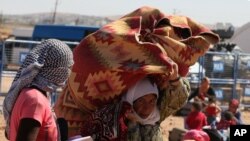Delegates at an international refugee conference agree humanitarian crises and needs are growing much faster than humanitarian agencies are able to respond.
They say United Nations and private agencies have reached the limits of their ability to help and warn millions of refugees and displaced people around the world will suffer from lack of aid unless new, bigger sources of funding are found.
There is a dramatic rise in global conflicts and in the numbers of people affected by them. For the first time since World War II, the number of refugees and displaced people now tops 50 million. But this hyperinflation of people in need of assistance is not matched by a corresponding increase in resources to help them.
The UN High Commissioner for Refugees, Antonio Guterres, says aid agencies are overstretched because of the multiplication of conflicts and the exponential growth of needs resulting from natural disasters, the consequences of climate change and population growth.
“The humanitarian community has reached its limits. Either there is a quantum leap — either there is a substantive change or we will no longer be able to respond," said Guterres. "It will be impossible to deliver according to the needs of the people we care for with business as usual."
Guterres also said many aid agencies have cut back on their humanitarian operations because of lack of money, and that headline-grabbing operations, such as those in Syria, Iraq, and Ukraine are suffering from poor funding.
But, he added, humanitarian operations in the largely forgotten African crises are at particular risk.
The UN refugee agency reports more than 15 million people in Africa have been forced to flee war and persecution, either across borders or within their own country. The high commissioner says it is critical to focus international attention on the horrible tragedies occurring in countries, such as the Central African Republic and South Sudan.
“The levels of human suffering are perfectly comparable with the ones happening in Syria or Iraq, but of course there is much less attention and there is much less political debate and there is much less funding support," he said. "That is the reason why we convened this high-level segment, and we hope that it will contribute to raise awareness on the need for a stronger commitment of the international community."
Guterres says it is time for governments and financial institutions to think outside the box and bridge the gap between relief and development aid. Development aid, he said, attracts roughly 10 times more money than does humanitarian aid, so it makes sense to link them.
The United Nations currently has a so-called Central Emergency Response Fund from which agencies can withdraw money to pay for immediate critical emergency needs. However, this fund is supported by voluntary contributions and has little money in reserve.
Guterres also says the existing fund should be converted into a Super Central Emergency Response Fund supported by mandatory contributions from member countries, which, he said, would make it possible for aid agencies to draw upon a much bigger pot of money to help contend with bigger emergencies as they arise.




